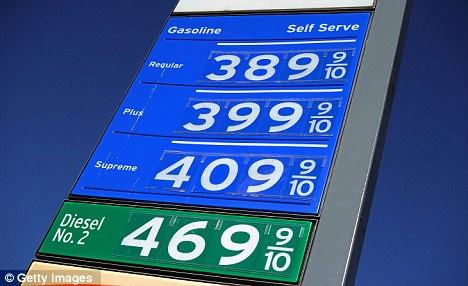
Michigan’s Governor looks to a gas tax to increase funding for roads and bridges. Photo: marsmet501 (flickr)
As vehicles are becoming more efficient and gas tax rates have remained the same for decades, those taxes no longer provide enough money to pay for the building and upkeep of roads and bridges, the Snyder administration says.
New technology that tracks how much a vehicle drives may provide an answer — but only way down the road.
Michigan now taxes motorists 19 cents per gallon for gasoline and 15 cents for diesel, last raised in 1997. And the federal tax of 18.4 cents a gallon hasn’t been raised in nearly two decades.
According to the Department of Transportation (MDOT), Michigan’s rate is one of the lowest in the Great Lakes area and the state’s gas tax revenue declined more than $100 million from 2001 to 2011.
“The tax needs to be raised,” said Lance Binoniemi, vice president of the Michigan Infrastructure and Transportation Association.
“The cars have been more fuel efficient, and since gas prices have been rising, people are purchasing less gas than before,” he said.
According to the Obama administration’s new fuel-economy standards for cars and light trucks, the average is expected to be around 35.4 miles per gallon by 2025. And 2012 model vehicles average 23.4 miles per gallon, according to the University of Michigan Transportation Research Institute.
One alternative would be toll roads, but Kirk Steudle, director of MDOT said that would be unworkable.
Some states have come up with a high tech solution called the vehicle miles traveled (VMT) tax. It taxes drivers by how many miles they travel rather than by how much gasoline they buy. It is implemented by using GPS units on-board a vehicle to record distance, assign it to the appropriate taxing jurisdiction and calculate the amount owed.
“This is an electronic-based method that makes every road a toll road,” Steudle said.
Minnesota and Oregon already are testing technology to keep track of mileage. Other states, including Washington and

According to the Michigan Department of Transportation, the state pays one of the lowest gas tax rates in the region. Photo: U.S. EPA
Nevada, are preparing similar projects.
According to Steudle, one of the biggest challenges is expense because it would require instruments in every vehicle rather than at gas stations only.
Privacy concerns pose another great obstacle for the VMT tax.
“Some people don’t like the GPS tracking them going everywhere, but like you young people checking in on Foursquare all the time, you already share with other people,”
Steudle said.
Binoniemi said the state doesn’t have enough education and knowledge about the VMT tax yet.
“Michigan is premature in moving in that direction,” he said.
Binoniemi predicted that the federal government would take action on the VMT tax before most individual states.
“They are seeing the same problem in gas tax as we are. There have been several studies looking into how we can address this concern by a VMT tax. I don’t think Michigan will begin this before the federal level,” he said.
And Steudle said, “We are always the first, but in this issue, we can be the second.”
